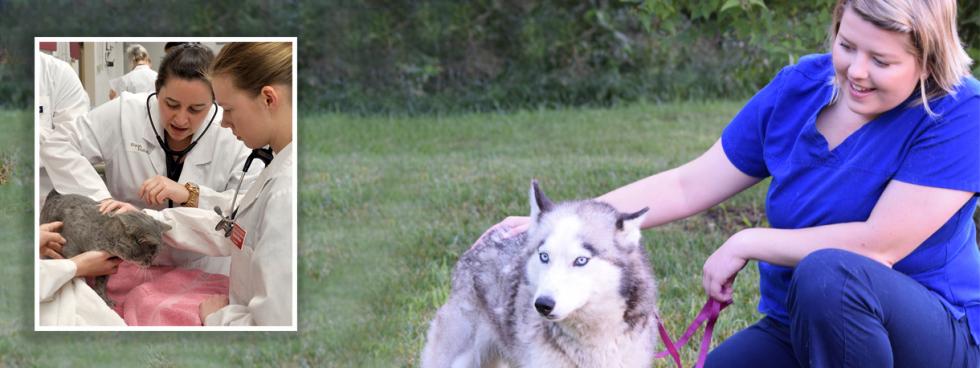
On the Way to Their Forever Home
Story courtesy of Forward, Iowa State University Foundation
No one loves Iowa State’s Veterinary Medicine Surgery, Anesthesia and Community Outreach program more than the pets themselves. It’s not only saving their lives; the program is helping make those lives worth living.
Take the case of three Chinuahuas: Margarita, Fajita and Tamale. Mom and sons entered the shelter system in 2018 in Charles City, Iowa; given up by an older couple whose health was failing. The small humane society – one of approximately 30 served by Iowa State’s program – delivered the dogs to the college’s outreach program. Margarita wouldn’t make eye contact. Fajita snapped and snarled. Tamale was even more aggressive.
“The students realized the dogs were scared and needed TLC,” says Dr. Joyce Carnevale, assistant clinical professor of veterinary clinical sciences and program coordinator. “We used low-stress handling techniques and behavior modification to decrease their fear and anxiety. They made great strides throughout their stay.”
Behavior modification is just one of many services the program provides. Over the course of a pet’s typical five-day stay, it will be evaluated, vaccinated and treated for everything from parasites to respiratory infections. It will be spayed or neutered. By the time the pet returns to the shelter, it will be adoption-ready.
“The donor-funded program serves shelters that don’t have a veterinarian on staff,” Carnevale says. “Since it began in 2016, we have treated approximately 1,800 pets. Over 95 percent of them have been adopted shortly after return to the shelter, largely because they have received comprehensive veterinary care.”
The second- and third-year students who staff the program say it’s a win-win.
“Not only do we get to help the animals, we learn more skills,” third-year student Stefanie Hurt says. Those skills run the gamut of small animal veterinary practice, from intake and labs to physical exams and surgery – skills that also characterize shelter medicine, which has been recognized as a veterinary specialty.
“Behavior problems and infectious diseases are common issues in shelters, as is funding of care,” Carnevale says. “Discovering cost effective, efficient and humane processes to deliver care is a constant goal.”
The urgent need for shelter medicine has come on the heels of changing attitudes toward companion animals, Carnevale says. “There has been a shift in the value placed on them. People are increasing willing to support welfare organizations with volunteer time and financial resources. The goal is to allow owners to keep their pets rather than surrender them for health and/or financial issues. Training veterinarians to serve this vulnerable population has been identified as a need.”
Students say it is a tremendously rewarding program. “We are making a difference in pets’ and people’s lives,” third-year student Lawton Herbert says. “That makes me very happy.”
Philanthropy provides critical funding for programs like Iowa State’s. “We could not run the program without donors,” Carnevale says. “They allow us to offer services to the shelters at no charge.”
As for the Chihuahuas, the brothers ended up being adopted by members of the same family. Margarita’s fate was just as happy. “She joined my fur family,” Carnevale says. “She is now completely settled into the family, bossing the big dogs, stealing the pillows and wearing her favorite cardinal and gold jacket.”
Shelter Pets’ Best Friends
Donors have funded scholarships for students who, as members of the Feral Cat Alliance or the student chapter of the Association of Shelter Veterinarians, are pursuing shelter medicine. Other donors provide support for training veterinary students in spay and neuter techniques, as well as dental procedures. And in a way, the animals themselves are beneficiaries of donor support: Like Dr. Carnevale, many students adopt the pets for whom they’ve provided care throughout their stay in the veterinary hospital at Iowa State.
July 2019
